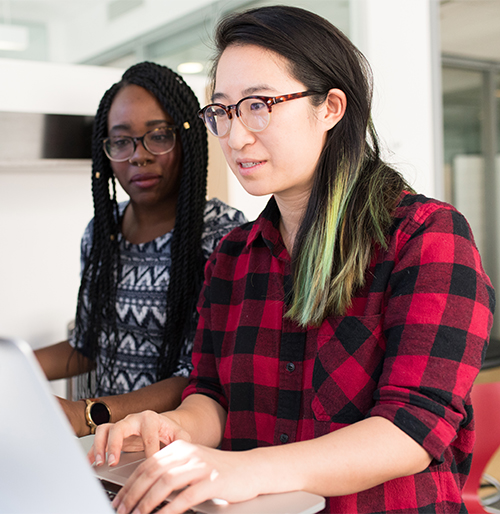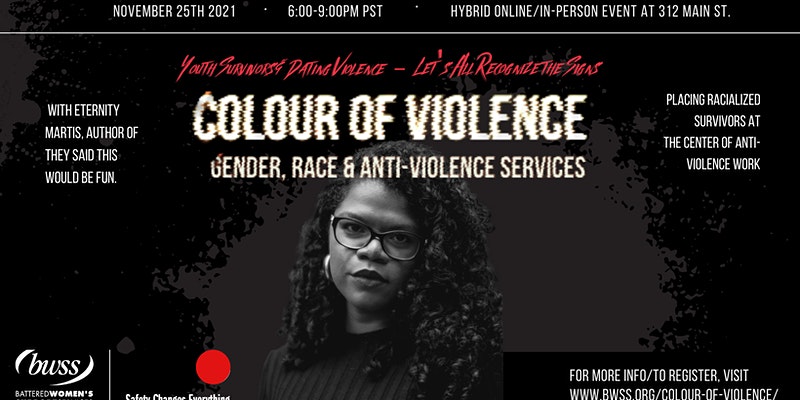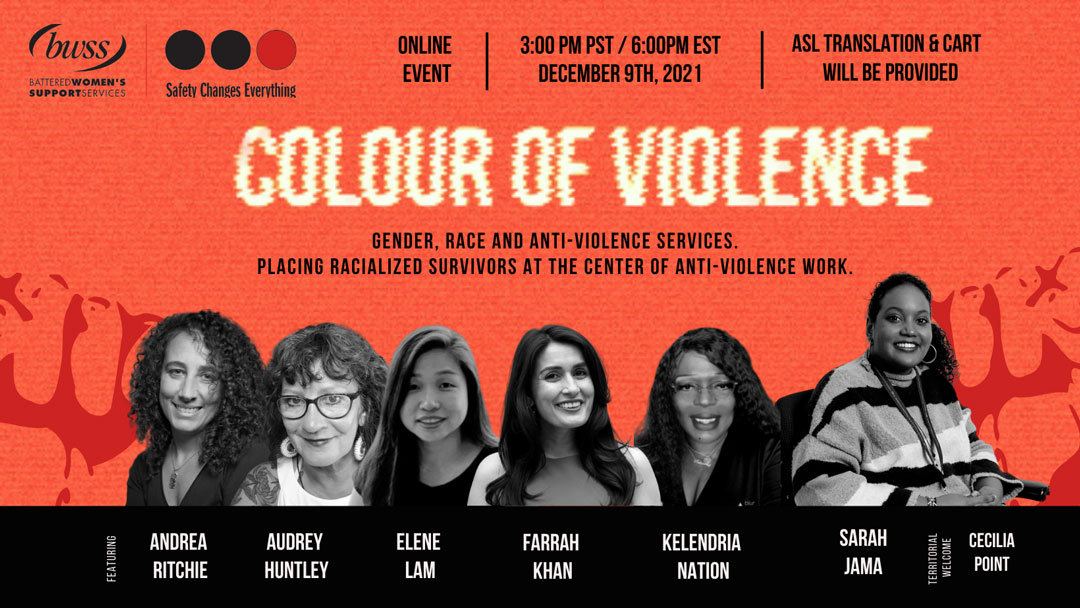Colour of Violence
Gender, Race and Anti-Violence Services
Placing racialized survivors at the center of anti-violence work
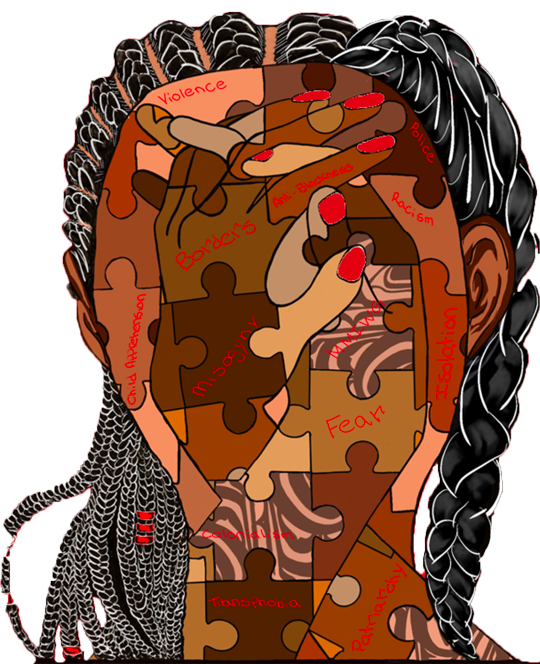
Report is LIVE
Read the full report
“The Colour of Violence: Race, Gender and Anti Violence Services” report, toolkit, and flip book are now available for download.
NOV 30 2022
Online Launch
11am – 1pm PST
Register to receive the webinar link and the “Colour of Violence: Race, Gender & Anti-Violence Services” report.
DEC 6 2022
In-person community gathering
6pm – 8pm PST
Join us for an in-person community gathering on the National Day of Remembrance and Action on Violence Against Women.
Battered Women’s Support Services (BWSS) is thrilled to announce the launch of our community-based research report Colour of Violence: Race, Gender & Anti-Violence Services.
Save the dates for our two public events!
Over the past year, BWSS has been engaged in a community-based research project to better understand and raise awareness on the experiences of Indigenous, Black, newcomer immigrant/refugee, and racialized survivors accessing gender-based violence services in British Columbia (B.C).
This work is motivated by the urgency of our moment.
The pervasive reality of gender-based violence and its overlap with many escalating crises —such as the pandemic, toxic drug supply, precarity of poverty, and climate catastrophe — all disproportionately and deliberately impact Indigenous, Black, newcomer immigrant/refugee, and racialized women, girls, and gender diverse people.
Canada has extreme difficulty recognizing how deep and profound racism is, and how racism is instrumental in compounding the impact of gendered violence for racialized survivors.
As we heard from one participant, “Understand that racism exists, and survivors experience it.”
Drawing on the foundational work of INCITE! Women of Color Against Violence, our own Colour of Violence: Race, Gender & Anti-Violence Services report explores the extent to which gender and race influence system-based responses to gender-based violence.
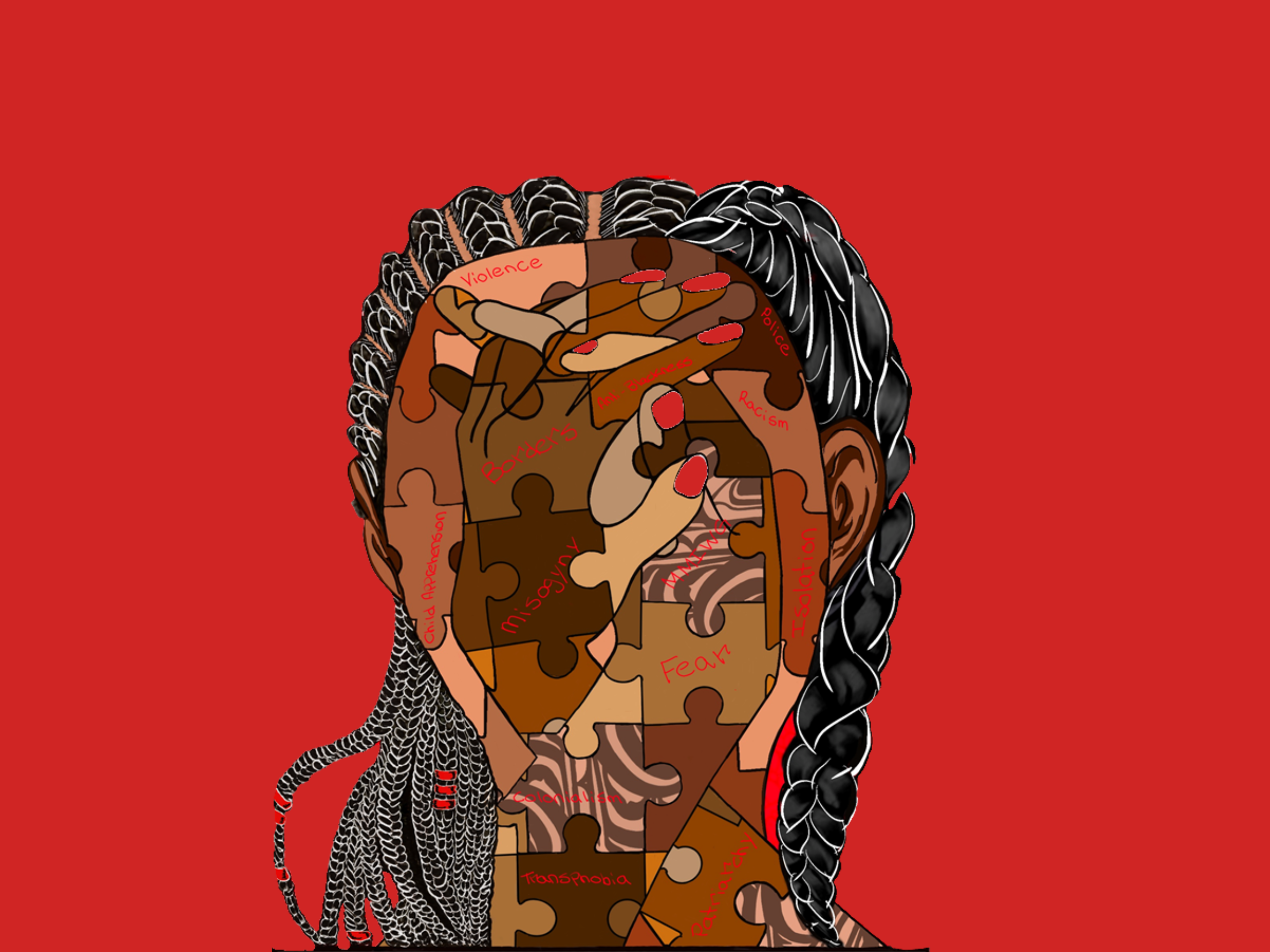
We specifically highlight the experiences of survivors navigating inadequate and inaccessible anti-violence services in B.C.
We also examine the police and criminal legal system, child services, immigration, and other institutional responses.
Our key research approach is a “by and for” approach, with all the work conceptualized and conducted by Black, Indigenous, and racialized staff of BWSS.
We conducted surveys with over 100 survivors, focus groups with anti-violence workers of colour, and a series of public events.
Through our research, we found that Indigenous, Black, newcomer immigrant/refugee, and racialized survivors in B.C face numerous barriers to accessing safety and support when they experience gender-based violence, such as lack of access to culturally safe services; mistrust of the legal system and other state systems; and being minimized or disbelieved.
One participant put it: “Nothing in the system is supportive — the system itself is abusive.”
Indigenous, Black, and newcomer immigrant/refugee survivors face particularly heightened barriers to justice, including often being criminalized for reporting violence, having their children apprehended, or facing deportation.
The report identifies key barriers in accessing anti-violence services, and also offers concrete best practices for service providers developing anti-violence interventions.
We are deeply grateful to all the participants who brilliantly and courageously shared their time and insights with us.
Their words powerfully illuminate what is needed to end violence against Indigenous, Black, newcomer immigrant/refugee, and racialized survivors in this province. We hope you join us in honouring their strength and in amplifying their truth-telling toward action.
As part of the #16DaysofActivism Against Gender-Based Violence, we look forward to seeing you at our Colour of Violence: Race, Gender & Anti-Violence Services launch events!
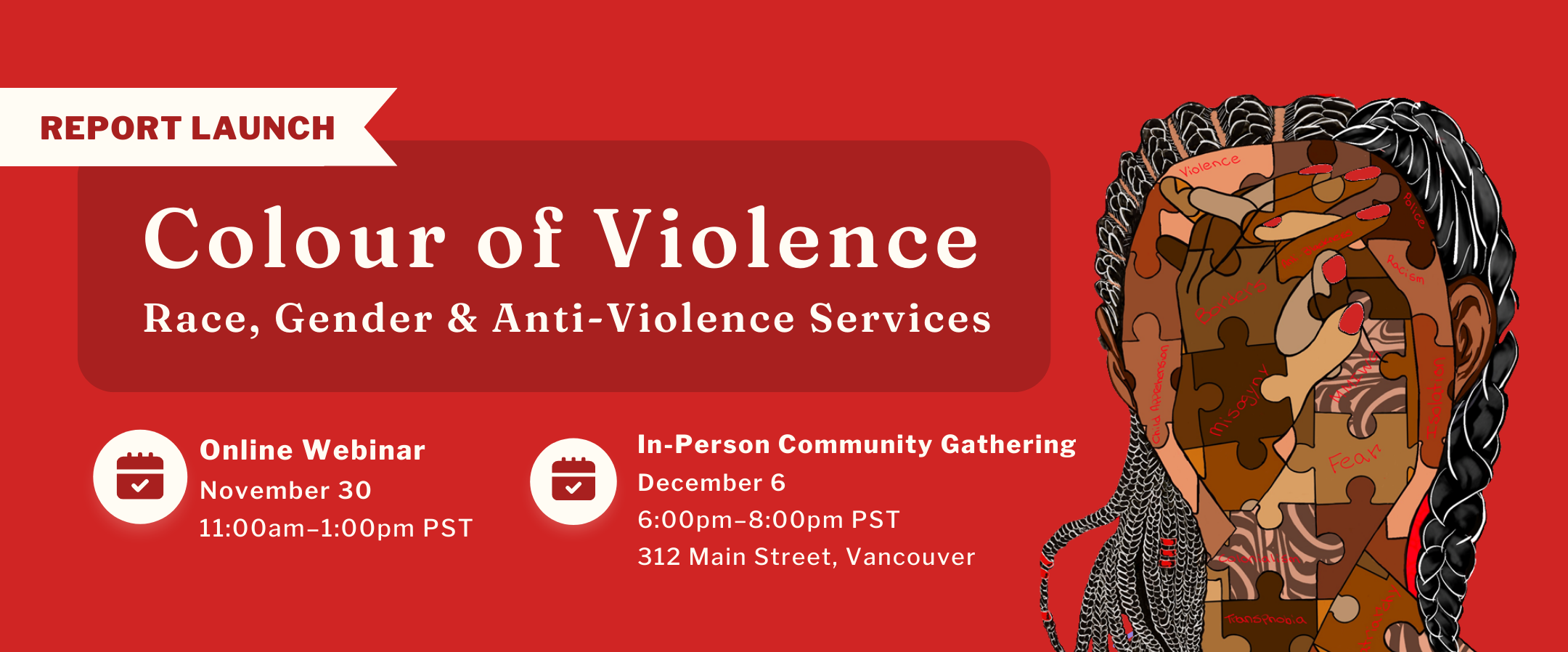
2021 events
Colour of Violence
Gender, Race and Anti-Violence Services
Placing racialized survivors at the center of anti-violence work
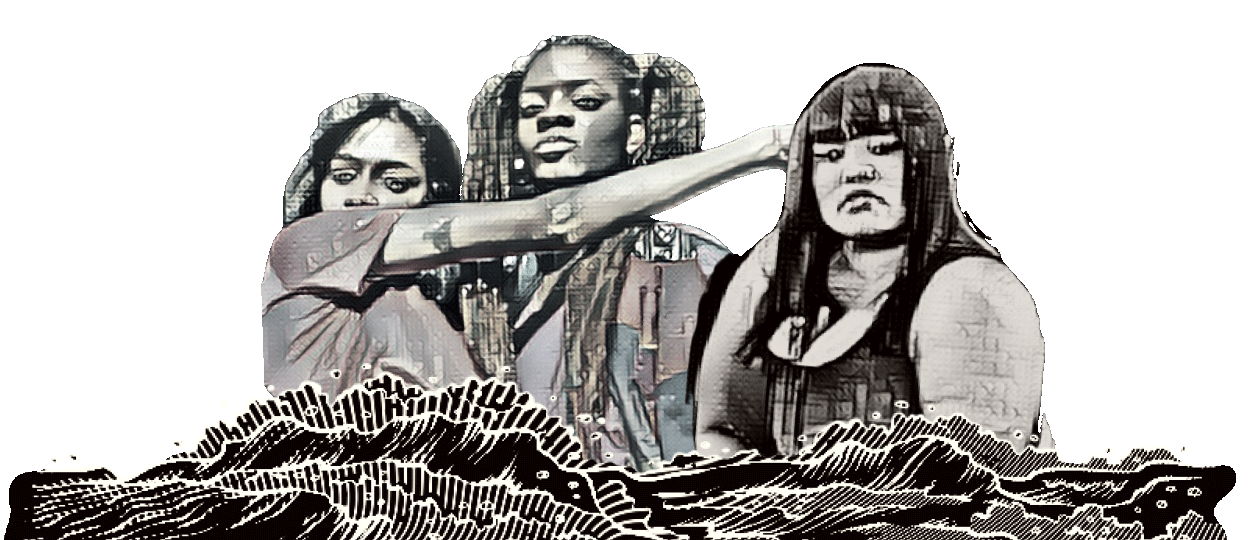
NOV – JAN 2021
Anonymous survey
Our short, anonymous survey was available both online and by PDF. Participants were entered in a draw for a $50 My Sister’s Closet gift certificate.
NOV 25 2021
Youth Survivors and Dating Violence – Let’s all Recognize the Signs
6pm – 9pm PST
Hybrid online/in-person gathering 312 Main Street with livestream
DEC 9 2021
Public Webinar
An evening of discussion with Black, Indigenous, immigrant/refugee, and racialized survivors on race, gender and anti-violence services.
Drawing on the foundational work of INCITE! Women of Color Against Violence, Battered Women’s Support Services (BWSS) is undertaking a multi-year Colour of Violence project to examine the intersections of race and gender for Black, Indigenous, migrant/refugee, racialized women and gender diverse people experiencing gender-based violence in British Columbia.
Based in anti-oppressive, anti-racist, decolonial and feminist principles, this work will position racialized survivors at the center of anti-violence work.
We wish to make visible the experiences of racialized survivors so that anti-violence service provision, advocacy, and government policy centers these unique realities. We also aim to challenge the homogenization of “women of colour” and tend to the specific experiences of Black, Indigenous, migrant/refugee, and women and gender diverse survivors of colour.
BWSS’s Colour of Violence project will explore the extent to which gender and race influence systemic responses to gender-based violence.
We will examine elements of police and criminal legal responses; the systemic barriers to accessing adequate gender-based violence services; and the intersecting involvement for Black, Indigenous, immigrant/refugee, women and gender diverse survivors of colour with child welfare, immigration, mental health, income assistance, housing, and other systems.
We know that safety changes everything, and we want to make visible the layered safety needs of Black, Indigenous, immigrant/refugee, women and gender diverse survivors of colour.
We invite you to join us in this important work.
Anonymous Survey
We are launching our first survey, focusing on issues of accessibility, safety, and the structural barriers of anti-violence services in British Columbia for Black, Indigenous, immigrant/refugee, and women and gender-diverse survivors of colour.
We would like to hear from you if you are:
Black, Indigenous, immigrant/refugee, racialized
Identify as a cisgender or transgender woman or femme, or as a gender diverse person
Live in BC
Are 19+
Complete our short, anonymous survey, available November 3 – January 23 2021, and enter a draw for a $50 gift certificate!
There are 11 questions in this survey, and we expect that this survey will take no more than 15 minutes to complete.
Your participation is important to us.
Or you can download, complete and return the survey in several different languages, all available here:
English
Spanish
Tagalog
Farsi
Punjabi
Simplified Chinese
Vietnamese
French
You can drop off a completed copy at the BWSS office if you access our services, email a completed copy to melody@bwss.org, or call 604-616-7528 to arrange return.
If you complete the survey, you can enter a draw for one of four $50-gift certificates to the My Sisters Closet store. It’s simple; just leave us your email at the end of the survey!
If you have any questions, please contact endingviolence@bwss.org
Youth Survivors and Dating Violence: Let’s all Recognize the Signs
To launch the international campaign 16 Days of Activism against Gender-Based Violence and to commemorate the International Day for the Elimination of Violence Against Women on November 25, 2021, we are delighted to invite you to Youth Survivors and Dating Violence: Let’s all Recognize the Signs.
DATE: November 25, 2021
TIME: 6pm PST / 9pm EST
FORMAT: Hybrid in person event with livestream
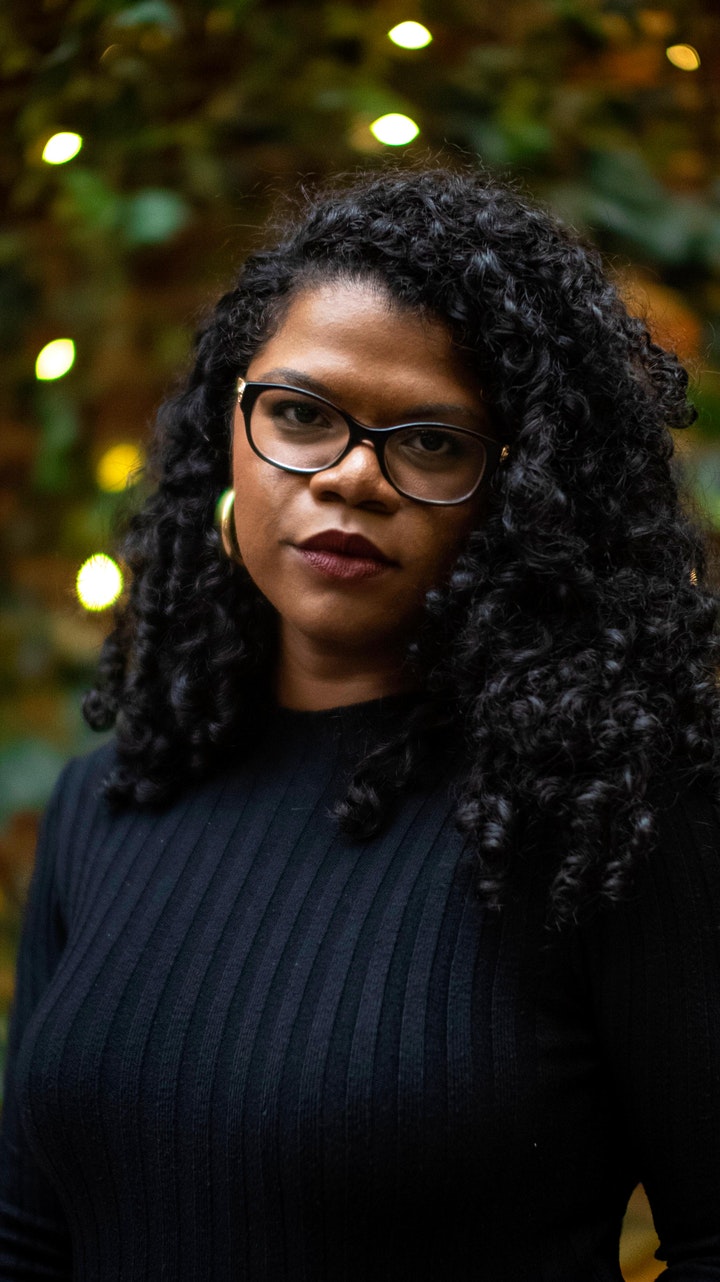
This event features Eternity Martis, an award-winning journalist and best-selling author whose debut memoir, They Said This Would Be Fun, was a “Best Book of the Year” pick by Globe and Mail, Apple, Audible, and Chapters/Indigo.
CBC called the book one of “20 moving Canadian memoirs to read right now” and PopSugar named it one of “5 Books About Race on College Campuses Every Student Should Read.” This year, They Said This Would Be Fun won the Kobo Emerging Writer Prize for Non-Fiction.
Intimate partner violence in high school and on university campuses is an everyday occurrence—still, there is so little recognition of the prevalence and very little discussion about it.
Eternity Martis’s keynote will highlight the prevalence of dating violence, the experiences of young women, femmes, and non-binary people, and what high schools and universities can do to address it.
This is a hybrid event in person and Livestream, registration and more information available at EventBrite:
Public Webinar
As part of the 16 Days of Activism against Gender-Based Violence, save the date and join Battered Women’s Support Services for an evening of discussion with Black, Indigenous, immigrant/refugee, and racialized survivors on race, gender and anti-violence services.
DATE: December 9, 2021
TIME: 3pm PST / 6pm EST
FORMAT: Online webinar
Territorial welcome and opening remarks by Cecilia Point, followed by a discussion with Audrey Huntley, Sarah Jama, Farrah Khan, Elene Lam, Kelendria Nation and Andrea Ritchie. Moderated by Angela Marie MacDougall and Leslie Varley.
TERRITORIAL WELCOME and OPENING REMARKS by CECILIA POINT:
Cecilia is a member of the Musqueam Nation. As a political activist advocating for human rights and the environment, Cecilia stood for 200 plus days protecting her nation’s ancestral burial site from development in 2012. Cecilia has also dedicated many years to cultural preservation in the field of Aboriginal cultural and ecotourism. She is a facilitator for reconciliation workshops with Bright New Day, and has been designated a public speaker for her nation.
AUDREY HUNTLEY:
Audrey is a paralegal, storyteller, and co-founder of No More Silence working with other Indigenous women, trans and two-spirit people. Audrey finds strength in the strong community networks No More Silence is building across Turtle Island and beyond. One of her recent works, the short film Not Just Another Case: When Your Loved One Has Gone Missing or Been Murdered was created to empower Indigenous community members and provide alternatives to the mainstream institutions that fail them. Smudge, Don’t Judge: Assisting Trans and Two-Spirit Survivors of Violence, a collaboration with Monica Forrester of Maggies Sex Worker Action Project and Trans Pride Canada is geared to service providers and addresses the homo and transphobia that prevents many Indigenous people from reporting or seeking assistance. Other initiatives that No More Silence is involved in include Indigenous Land Defence Across Borders which took members of the group to Palestine in 2018 to meet and exchange experiences of settler colonialism with local activists. Currently, Audrey is completing a film on Disability Justice in Indigenous Ceremony with Elder Wanda Whitebird. Together they are challenging the ableism the prevents many Indigenous people with access needs from joining in ceremonies or cultural events.
SARAH JAMA:
Sarah is a community organizer from Hamilton, Ontario. She is co-founder of the Disability Justice Network of Ontario (DJNO) and holds a Social Sciences degree from McMaster University. Her lived experiences have fostered interests and a passion for community engagement, disability justice, and activism. Sarah currently works at the Hamilton Centre for Civic Inclusion.
FARRAH KHAN:
Farrah has spent two decades raising awareness about the intersections of gender-based violence and equity through education, policy, art creation and advocacy. She is the founder of Possibility Seeds, a member of the Government of Canada’s Advisory Council on the Strategy to Prevent and Address Gender-Based Violence and the Manager of Consent Comes First at Ryerson University. Farrah is co-founder of Use The Right Words: Media Reporting on Sexual Violence and co-director of Courage to Act, the first national project of its kind to address and prevent gender-based violence on post-secondary campuses in Canada.
ELENE LAM:
Elene is the Executive Director of Butterfly – Asian and Migrant Sex Workers Support Network, founded to support Asian and migrant sex workers to address the unique challenges and violence they face across gender, race, language, social status, criminalization of sex work, and legal immigration status.
KELENDRIA NATION:
Kelendria is a Black woman of Trans experience of Caribbean descent who uses her perspective and unique experience to bring awareness to the various issues surrounding trans people; especially trans women of colour. She has dedicated herself to using her voice to impact change and bridge understanding across all communities. She provides advocacy, resolutions and transitions for Trans identified peoples. Through her work in community space through advocacy, she strives to allow folks to see that Trans, Non binary, and 2spirit identified folks because of their multiple intersections are often times left out in conversations. With collaboration and standing in solidarity with other community members she has been given the tools of being able to communicate her experience which has allowed her to tell her own story in her own voice. It is her hope that in time there will be more opportunities to empower other BIMPOC identified folks in the same which she has been. She currently has her own consulting business “Kelendria Nation Consulting” where she works on prioritizing Transgender health and inclusion in various settings including within in the health care system, non-profit organizations and other allied organizations working towards Transgender, gender diverse and two spirit inclusion within their organization.
& ANDREA RITCHIE:
Andrea is a Black lesbian immigrant survivor who has been documenting, organizing, advocating, litigating, and agitating around policing and criminalization of Black women, girls, trans, and gender nonconforming people for three decades. As a member of the national collective of INCITE! Women of Color Against Violence, she served on the editorial collective for the Color of Violence Anthology. She is the author of Invisible No More: Police Violence Against Black Women and Women of Color and co-author of Say Her Name: Resisting Police Brutality Against Black Women, Queer (In)Justice: The Criminalization of LGBT People in the United States, and No More Police: A Case for Abolition (forthcoming). She co-founded the Interrupting Criminalization initiative with Mariame Kaba, as well as the In Our Names Network, a network of over 20 organizations working to end police violence against Black women, girls, trans and gender nonconforming people. She has authored numerous research reports, articles, and opinion pieces on policing, criminalization, mass incarceration and immigration enforcement.
Co-Moderated by ANGELA MARIE MACDOUGALL (Executive Director, Battered Women’s Support Services) and LESLIE VARLEY (Executive Director, BC Association of Aboriginal Friendship Centres)
In the lead up to this webinar, we will also be conducting focus groups with frontline anti-violence workers of colour across the province to assess how gender and race influence the accessibility and adequacy of anti-violence services and responses to gender-based violence.
We look forward to your participation and involvement as we engage in this work. As an intersectional feminist voice against violence and oppression, BWSS provides frontline support and advocacy, as well as community education and training about gender-based violence. For more information about the Colour of Violence project, contact endingviolence@bwss.org.

